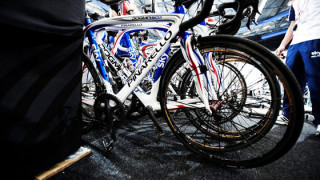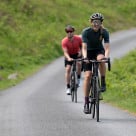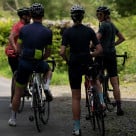Published: 4 May 2012![]()
Words: Simon Powers
We are all familiar with many of the riders and coaches responsible for the great performances of the Great Britain Cycling Team. But in the lead up to this summer’s Games, we’re taking the opportunity to have a look at some of the staff from the Great Britain Cycling team who tend to go unnoticed but without whom, the team could not function.
Keith Reynolds, Major Events Logistics Manager for the Great Britain Cycling team, has been in this role now for about two and a half years. Previously, he managed the BMX strand of the team’s operation, a role very similar to his current one but on a much smaller scale, with just five male and two female riders on the team.
Keith is responsible for all the logistical arrangements of the Great Britain team at major events, such as world cups and world championships. He liaises with hotels, books flights and airport to venue transport. In addition, before an event such as the track world championships in Melbourne, he will speak to coaches and ensure that the travel timings fit in with the training needs of the riders.
|
“In previous Olympic events, as you are not the host nation, you would just turn up whereas as in London you potentially have the ability to make things perfect.” Keith Reynolds, Major Events Logistics Manager |
||
As he is in charge of major events, Keith is fully aware that every step must be taken to ensure that potential problems are eliminated before travelling. He will often travel to a hotel in advance just to check that it will be able to cope with the massive demands that having such a large team of riders, coaches, and support staff (as well as all their equipment) will put on any establishment. Although, often this is not required:
“We often go to same places such as Melbourne, Cali, Beijing so don’t need to pre check every one, as you’ve been there before, it’s just places you don’t know where you need to be careful”.
As well as booking the accommodation for staff and riders, it is also Keith’s responsibility to make sure that all the bikes and equipment arrive safely, in one piece and on time. This has not always been as straightforward as it may sound as Reynolds explains:
“One of our main challenges was the first round of the track world cup in Kazakstan last November. Just getting the kit there was a major undertaking. What a lot of people don’t realise is that the aircraft which fly to such places cannot take all the equipment which we need. As we figured there would be a lot of teams that would need to take out kit too, we reluctantly sent some stuff out cargo for the first time ever.
“In addition, coming back, we had thousands of pounds of bike equipment to get back to Manchester. Myself and one of the mechanics waited at the velodrome in Astana for a courier company to come and collect our equipment. An unmarked van came up with no ID and took all the equipment away. When asked if there was any paperwork they said, ‘we don’t do it like that in Kazakhstan’. So we loaded it all up and hoped for the best. It all arrived back in Manchester just as we had packed it, thankfully.”
However, when it comes to career challenges, the upcoming Olympics is almost certainly in a league of its own:
“Now we are back from Melbourne, we need to start building towards the Games, beginning with arranging the Track riders’ holding camp in Newport. On top of this there are arrangements to be made in Surrey for the road riders and in Essex for the mountain bikers.
Although the Olympics this time around will be a home Games, which might seem less of a logistical issue due to its close proximity to the team’s base in Manchester, Reynolds admits that because the team will be looking to maximise home advantage, it has the potential to be even more demanding, such are the expectations the team have for themselves at the event.
“In previous Olympic events, as you are not the host nation, you would just turn up whereas as in London you potentially have the ability to make things perfect.”
In terms of the numbers of items that will be taken to London, the Games will see a very similar “lift” to that done for the world track championships.
“We flew out to Melbourne with 46 bikes. In addition to this, we took 100 pieces of equipment such as rollers, turbo trainers, mechanics’ tool boxes etc. To top this off, sports scientists from the English Institute of Sport take everything from video analysis equipment right through to air purifiers and special mattresses for the riders.”
Reynolds will work closely with his colleague, the vastly experienced Doug Dailey, who will be mainly involved in the road group, whilst Reynolds looks after proceedings at the velodrome. The road will be quite a difficult challenge as, instead of having riders all in one place ahead of the Games – as the track riders will be in Newport – the road riders will be coming in straight from their teams at the Tour De France.
In contrast, the BMX group is much smaller and they will almost look after themselves. The BMX riders will go straight from training into the venue just prior to competition.
Although looking forward to the Olympics, Reynolds admits that there is going to be little time to actually soak up the atmosphere and enjoy the event. It will be a four week non-stop job in his case.
Even when the Olympics are finally over, Reynolds and the back-room staff who keep the GB Team machine ticking over, will not be putting their feet up. Whilst the leading athletes finally take a well earned break at the end of a long season, Keith will go straight into organising the team’s visit to the road world championships in Limburg, Holland, from 15 to 23 September. Hotels in Limburg had already booked up as early as January and Reynolds admits that it would have been a challenge to find enough accommodation if it hadn’t been for a few fortunate cancellations by other national teams.
The road worlds will be followed by the European Track Championships in Panevėžys, Lithuania in late October. Then a full UCI Track World Cup season will get underway, finishing off with the UCI Track World Championships to be held in Minsk, Belarus from 20 - 24 February 2013. The fact that this will fall in the middle of the Belarusian winter (the temperature dropped to a bitter low of -27 degrees centigrade in Minsk during February 2012) will ensure Reynolds is kept on his toes once again. As our thoughts turn to the (hopefully) long, hot summer of Olympic sport, Reynolds is already thinking ahead to a wintery trip a continent and three seasons away.





